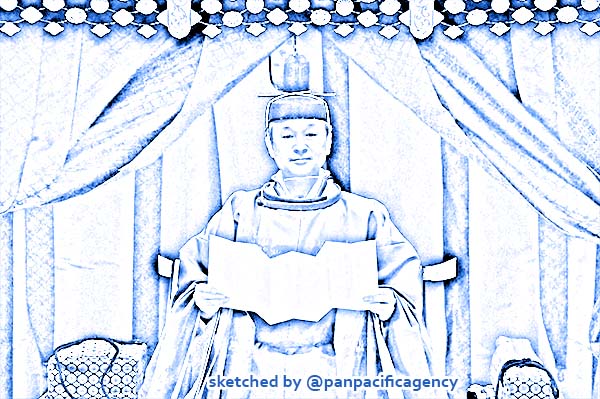81% back idea of Japan having female emperor: Kyodo News poll

In this image made from video, Japan's Emperor Naruhito proclaims his ascension to the Chrysanthemum Throne at the Imperial Palace in Tokyo, on Oct. 22, 2019. (Pool via AP). Sketched by the Pan Pacific Agency.
TOKYO, Oct 28, 2019, Kyodo. A whopping 81.9 percent of respondents to a Kyodo News survey over the weekend said they are in favor of the idea of Japan having a female emperor, while 13.5 percent indicated they are opposed, reported the Kyodo.
Concerns persist over the stability of Japan’s imperial succession, as the 1947 Imperial House Law stipulates that only males of the patrilineage can ascend the throne.
Following the enthronement of Emperor Naruhito, 59, the family now has only three heirs — the emperor’s younger brother Crown Prince Fumihito, 53; the crown prince’s son Prince Hisahito, 13; and Prince Hitachi (Masahito), 83, the uncle of the emperor.
Emperor Naruhito and Empress Masako have a daughter — Princess Aiko, 17 — and there are other females in the imperial family, but the Imperial House Law requires women to abandon their imperial status after marrying commoners.
Regarding whether to allow heirs of female lineage to ascend the throne, 70.0 percent in the poll supported the idea, while 21.9 percent were against it.
The nationwide telephone poll conducted on Saturday and Sunday, covering 732 randomly selected households with eligible voters as well as 1,282 mobile phone numbers, obtained responses from 505 and 504 people, respectively.
Earlier last week, a conservative group within Prime Minister Shinzo Abe’s Liberal Democratic Party finalized proposals to allow men from now-abolished collateral branches of the imperial family to rejoin it, as part of measures to ensure stable male-line succession.
The group’s ideas include having unmarried male members of the former branches join the imperial family through adoption or marriage, if they want to. It has suggested the creation of a law to enable this as an emergency measure, instead of revising the Imperial House Law, and is against allowing women to remain imperial family members after marriage.
Emperor Naruhito officially proclaimed his enthronement in an ancient-style ceremony last Tuesday before some 2,000 guests, including dignitaries from about 190 countries and international organizations.
He became Japan’s 126th emperor on May 1, the day after his father, former Emperor Akihito, stepped down — the first Japanese monarch to do so in about 200 years.